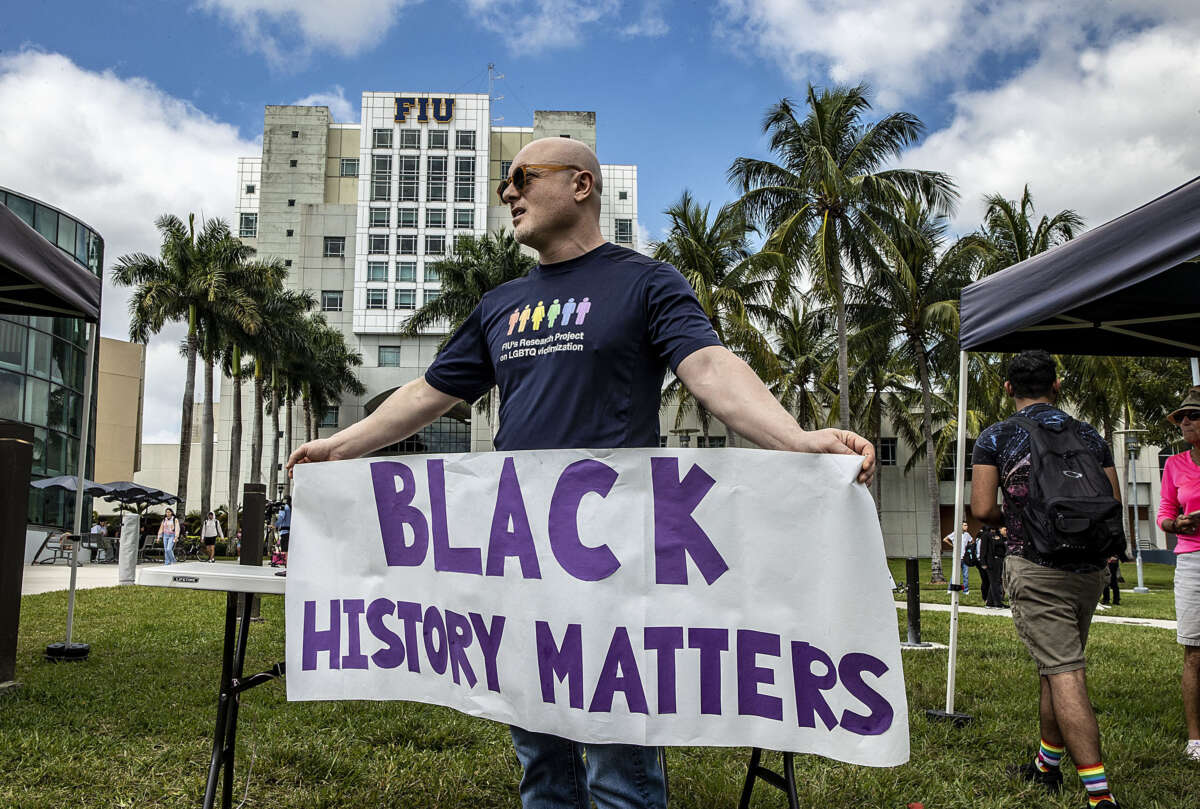Students from colleges and universities across Florida protested on Tuesday against a Republican proposal that would effectively ban courses and activities on diversity at institutions of higher learning.
House Bill 999, which was proposed earlier this month, would ban colleges and universities from funding “any programs or campus activities that espouse diversity, equity, or inclusion or Critical Race Theory rhetoric” — terms co-opted by far right lawmakers in their relentless campaign to ban discussion of Black History and LGBTQ topics in schools.
The bill, which is backed by Gov. Ron DeSantis (R), has already passed in the state House and is being debated in the state Senate.
On Tuesday, students from across the state staged a sit-in at Florida A&M, a public, historically Black university in Tallahassee. The sit-in took place where Florida’s Board of Governors, which oversees the state’s institutions of higher learning, hold meetings, and was attended by students from Florida State University (FSU), the University of South Florida, New College of Florida, and more.
“We are not hiding behind closed doors and we are not sitting idle. We are standing up and fighting back,” said Laura Rodriguez, an organizer who was arrested for protesting the bill in the state legislature earlier this month.
Isabela Casanova, an organizer of Tuesday’s protest and president of Florida State University’s chapter of Students for a Democratic Society, said the proposal by Republican lawmakers was in direct opposition to student’s desires.
“We want the protection and expansion of diversity programs and multicultural groups, we want an increase of Black enrollment at FSU and we want the university to take a public stance against DeSantis and his attacks,” Casanova said.
Faculty at campuses across the state have also spoken out against the bill. Last week, for example, FSU faculty passed a unanimous resolution condemning the bill, urging the university’s leaders to do the same.
Faculty in a number of departments at FSU noted that the language of the bill — which bans courses “based on unproven, theoretical, or exploratory content” — would affect a wide range of disciplines.
“General relativity is … actually unprovable, as I recall,” math professor Greg McColm told The Tampa Bay Times. “Science is unproven theoretical, exploratory content.”
Though the bill is likely to pass in the Republican-controlled state Senate, it is opposed by most Florida residents. According to polling conducted by the University of North Florida’s Public Opinion Research Lab earlier this month, only 35 percent of Floridians said they want HB 999 to pass, while 61 percent said they are opposed to the measure.
Among college-aged respondents, the poll found an even wider gap: Only 29 percent of Florida residents between the ages of 18 to 24 said they approve of the bill, while more than two-thirds (68 percent) said they are opposed.
Join us in defending the truth before it’s too late
The future of independent journalism is uncertain, and the consequences of losing it are too grave to ignore. We have hours left to raise the $12,0000 still needed to ensure Truthout remains safe, strong, and free. Every dollar raised goes directly toward the costs of producing news you can trust.
Please give what you can — because by supporting us with a tax-deductible donation, you’re not just preserving a source of news, you’re helping to safeguard what’s left of our democracy.
